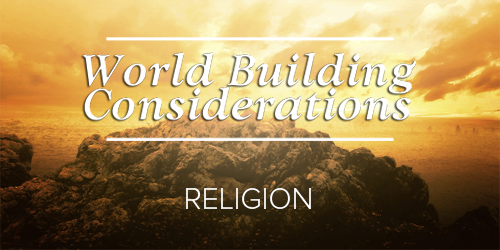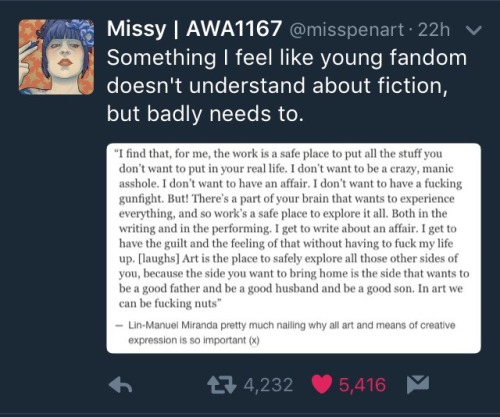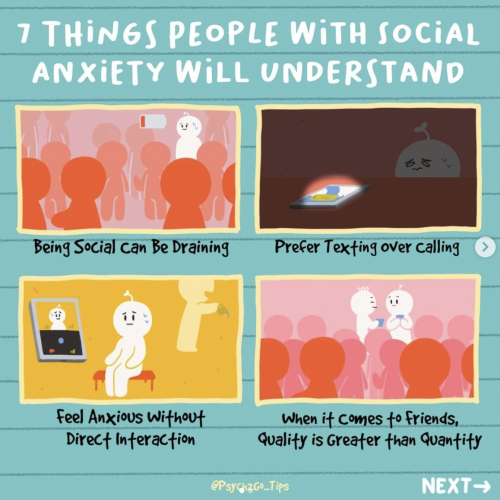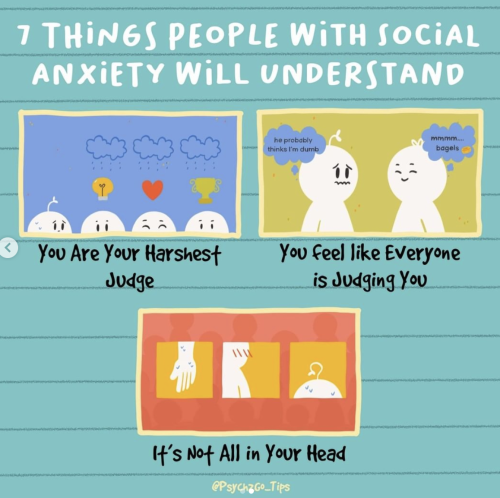
Sejam bem-vindos! Olá, esse é meu blog pessoal. Escrevo fanfics Pernico/Nicercy e orginais, e reblogo alguns posts de vez em quando. História Atual Não há lugar como o Lar - versão em Portugues There's no Place like home - English version Resumo: Nico está voltando da Itália depois de passar dois anos por lá e encontra Percy, o melhor amigo que ele deixou para trás, mas que manteve contato nesse tempo afastado. O resto se desenvolve a partir desse reencontro. Se você quiser saber o que eu escrevo, siga a tag #my writing
464 posts
Latest Posts by auroraescritora - Page 16
thinking about why queerbait ships are so popular here and realised that they make really good love stories because they're naturally slow burns. the two people will only get together after a long time, if ever, because the writers don't often want to commit to writing a queer relationship - they'll just pull the classic 'it's up for interpretation'
so since the pairing are 'friends' we get to see their relationship genuinely develop over a longer period of time than the classic 'i've known you for 3 episodes and i want to start dating' because in my opinion at least, that usually feels really forced and fake, whereas friends to lovers or even enemies to lovers is a much better dynamic
and that gets people invested!! the relationship feels complex and real and people are convinced that they're going to get together so of course we keep watching. all the writers need to do is, you know, actually write these things as romances instead of queerbaits that are never intended to be canon
anyway yeah that's my input. yes this is about destiel but also every other vaguely gay queerbait ship that never gets resolved ¯\_(ツ)_/¯
Save a fanfic writer, leave comments on old fics
There is this a peculiar set of reasons and biases when it comes to NOT commenting on AO3.
They are all false, but here they are:
Do not comment on old fics
Do not comment on each chapter of a multichapter
Do not comment if the author left the fandom
Do not comment if the author doesn’t respond to comments
It can be summoned up as DO NOT ACT LIKE YOU ENJOYED THE WORK AND YOU LIKE THE AUTHOR.
It comes from the idea, that if you leave a comment on my old work, or leave too many comments, I will think you are strange, clingy, and gross.
Readers are imagining it as commenting on an old Facebook photo — only your granny and creepy strangers do that.
That is not the case with AO3.
Writers put their works there for long-term storage, and we expect, wish, and hope that you will like our works and tell us about it.
This all very interesting, not, but why should I care?
This has awful consequences. Fanfic authors feel constant pressure to create more and crippling fear of being forgotten, useless, and being literally kicked away from fandom.
I’m online friends with a few great fandom authors, who wrote storied with thousands of kudos, but ALL of them at some point expressed this fear. Very talented people told me, “I’m not sure if I should have ‘writer’ in my bio. I didn’t post anything new in the last half of a year.”
Some young or entitled readers might say, “Hm, well, they are right. They should create MORE to be relevant. Isn’t that a good thing to push authors to write more?”
For better or worse, life doesn’t work like that. We are talking about real people, who go to real schools, have real jobs, families, and all the other important things outside the fandom. Some of them might push to create more from that fear, but most would only get more frustrated and depressed about the whole fanfic writing.
So, please, if you like the work comment on it.
Even if it’s old, even if it’s a multichapter, even if the author doesn’t have time and energy to interact. Especially in all those cases.
Encourage your authors, and show them your support.
Comment on fanfics
A few days back on AO3 I found an unfinished, two chapter spideypool fanfic that was cute and had lots of potential and was also last updated two years ago. Two whole years! And it had only three comments, all of which on chapter one, none on chapter two. I enjoyed the fanfic, despite it being far, FAR from being finished and the chance of it ever updating again anytime soon was just about zero. So you know what I did?
I wrote a damn comment. On chapter two.
And I made sure that fucker was long and had a small theory of where I think the author would take the fanfic in the future. I let the person behind the fic know that I friggin LOVED the two chapters I got to read! That I would LOVE to see more! That I’d jump out of my skin in happiness and virtually hug them half to death if I saw that they updated it.
Let me remind you this fic wasn’t updated in two YEARS! I was the first to comment on it in a year. And the first to comment on chapter two! And you know what happened today?
I got a reply.
From the author of the fanfic. And the author said how I gave them life for a project they had loved (still did) and that they were now working on a third chapter. After two YEARS of not updating. Of not writing. And it makes me so friggin happy seeing what I did. What I caused.
With a single. Damn. Comment.
All that it took for me was to think a bit about what I wanted to tell the author and the comment it. All it took was one comment. And suddenly this person was inspired to continue a fanfic they had abandoned for TWO YEARS!!
I couldn’t be happier. I couldn’t be more proud.
Comment on people’s fanfics. No matter how few chapters there are. No matter how many years have passed since their last update. Comment. You like a fanfic? Comment on it. It’s that easy.










UNC rape survivor Delaney Robinson comes forward with brave statement
Delaney Robinson, a sophomore at the University of North Carolina Chapel Hill alleged Tuesday that a football player at the school raped her in February and that UNC has done nothing about it. In a powerful personal statement she explained how “she did everything a rape victim is supposed to do.”

I did a post on religion a while ago, but I can do a better job with it.
Part I: World Building Considerations: Religious Hierarchies
Part II: World Building Considerations: Deities and Mythologies
THE BASICS
Religion is the belief that supernatural or spiritual powers exist.
There are four “branches” of beliefs that form the way a person feels about their religion (or lack of) and other religions. They are:
Theism: A theist believes in a god (or more).
Atheism: An atheist lacks the belief in a god (or more).
Gnosticism: A gnostic believes it is possible to know that a god (or more) does or does not exist.
Agnosticism: An agnostic believes that it is not possible to know that a god (or more) does or does not exist.
These create people who are one of the following (this can change throughout a person’s life):
Gnostic Theist: These characters believe in a god (or more) and are absolutely sure that it exists. Depending on the personality of this character, they might take offense if other people tell them they are wrong or that their religion is false. Others will brush it off and not care.
Agnostic Theist: These characters believe in a god (or more), but do not claim to know for sure if this god exists. These characters might struggle with their religion if this existence is important to them.
Gnostic Atheist: These characters are absolutely sure that there is no god (or more).
Agnostic Atheist: These characters do not believe in a god (or more), but do not claim to know of its existence for sure.
THE BEGINNINGS
Most early religions began with animism. This is when supernatural powers, life, souls, or spirits are attributed to the natural world as well as objects.
Sometimes, deities can be created when certain attributes as parts of the natural world are viewed as more important than others. A population may give a name to a particular spirit (like the sun) and thus make a deity out of it. Over time, this leads to polytheism.
The earliest deities were most likely female because back then, humans believed that women had the ability to create life from nothing. This is why “virgin” deities, goddesses, beings, and religious figures are common. They are seen as being able to make life by themselves, but the concept of virginity has changed to being “clean” or “pure”.
Early monotheistic religions often came from polytheism, but not always. What happens is one deity becomes more important than all the others for whatever reason. Here are some reasons for why monotheism might have come up in your world (with the exception of the spread of religion):
A person claims that one deity is the true deity. All other deities are slowly forgotten or reassigned as lesser religious beings, but not deities.
One deity may be more important than the other deities. Over time, this deity becomes the sole deity. All other deities are slowly forgotten or reassigned as lesser religious beings, but not deities.
A historical figure transforms into a deity over time through myth and legend, thus becoming a major deity.
One deity might “absorb” other deities and their attributes due to its importance, thus becoming a single deity who is a mixture of other deities.
Religion does not always evolve in this order and it does not have to. There is no “ultimate” form of religion. Monotheism is not “civilized” and animism is not “primitive”. They are both valid religions, they just exist in different ways.
One source of conflict for your story could be the switch from one form of religion to another. If polytheism is moving into monotheism, a minority of the population might be trying hard to hold onto old deities.
Of course, there are more types of religion other than animism, polytheism, and monotheism, such as naturalism. Look around at various religions for some inspiration.
NAME
The name! You have to name your religion. The followers of this religion need a name to refer to themselves by. You can also have names for the various branches of a religion or for the followers of a specific religious figure. If you’ve made up a language, you can use that language to create a name. You can also name the religion after a deity, a historical figure, or a religious figure. You can also name it after the founder of the religion.
ORIGINS
Where did this religion originate? With older religions, it might not be clear. Other religions have a clear start, or at least are known to have started in a specific area or with a specific person. If there is a founder of the religion, create this character and their history.
You also need an origin story for the world. A lot of religions have them.
REASON AND APPEAL
There are three general reasons for why people practice religion:
Sociological: Religion is used for cultural conformity. It unites a community through similar morals and values and can be used to control a population or to bring general peace among worldviews. If you can influence a person’s thoughts, you can control their actions.
Cognitive: Religion has been used to explain the unknown and to help people make sense of the world they live in. Myths, legends, and deities have been used to explain why the seasons change or why storms happen. Religion offers an explanation.
Psychological: People turn to religion in times of need or emotional struggle. They might turn to religion because they have a sick family member or they might turn to religion because they need an end to a drought. Having a reason to hold on (religion) can help people get through the hard times.
It’s common that all three reasons exist together, but one reason may outweigh another in an individual or a population. For example, in a time of famine, the majority of a population might turn to religion for reason 2. In a society with little understanding of science, the majority of the population might use religion for reason 1.
When creating a religion, think about why your characters are religious or why they are not religious. Think about situations that would make them approach religion. All characters will differ based on their personal needs, how religious they are, and how they were raised. Some characters might only turn to religion when they are extremely desperate.
SACRED TEXTS
A sacred text is a general term that refers to a text that is important to a religion. The Bible is an example. Sacred texts do not have to exist in a religion. Oral histories can take their place or exist alongside them.
If there is a sacred text, decide how it is supposed to be read. Some religious texts are meant to be read by a religious official, who teaches others what it says (the Bible). Other texts are meant to be ready by everyone and interpreted on an individual level (the Qur’an).
If the sacred text is meant to be read by a religious official and no one else, religious officials will be educated while most of the population will not be (depending on the society, available education, hierarchy, and technology available to spread written texts). Lack of literacy might be used to control the population.
Sacred texts might be a part of the government. If so, create laws carefully and make sure you know all the details about the religion and the government you’ve created.
Another option for a sacred text is one that is created by an individual or by a community. These sacred texts are filled with whatever information a person sees as important to the way they practice their religion. They may collect information through religious officials, oral histories, or their own experiences. These sacred texts can be passed down to another generation.
Here are some things you can put in a sacred text:
Historical Accounts: If a sacred text is just a historical account of a religion, you’ll need to come up with mythologies that fit into this text.
Laws & Guidelines: Sometimes, a sacred text is used to write down laws and guidelines of a religion.
Prayers, Songs, etc.: If prayers, chants, songs, and other spoken words are important to a religion or hold meaning, they might show up in a sacred text.
PLACE OF WORSHIP
Not all religions have a place of worship. However, places of worship can be as grand as the Hagia Sophia or they can be as simple as a personal altar in one’s home.
Within certain religions, such as Catholicism, there can be a hierarchy of places of worship. For example, a Cathedral is a church, but it also acts as the seat of a Bishop for a given area. Places of worship, in times when the majority of the population could not read, used lots of common symbols within the architecture so that people knew it was a place of worship for a certain religion. This is why many medieval religious buildings portray religious stories or figures within the architecture.
If there are places of worship in your world, put them in your story. If they are in a city or near a trading center, they might be more grand than others due to available resources. If a government official commissions one of these buildings, it will likely be large and detailed due to available expenses. Places of worship in isolated areas are likely to be smaller and simpler.
Make these places known in your world. Give them a feel. A lot of religious buildings are meant to give the feeling of grandness and divinity. Some might make a person feel small and insignificant. Give these buildings a demeanor. This will help readers get a feel for this religion while also setting the mood and tone for the scene.
BELIEFS
Create the main beliefs and philosophies of your religion. This will impact your society as a whole. However, there should be differing opinions and beliefs within a religion. People are going to interpret parts of a religion in different ways and will have different opinions on how to approach a religion.
Opposing Forces: Some religions have opposing forces within it, such as good vs evil. Some religions don’t have opposing forces and rather see everything just as it is without attributing morality. Decide how your religion views the world.
Opposing Forces 2: This refers to the opinions of people within the religion. Having differing opinions within a religion can be mild, but it can also be extreme. The latter can cause lots of conflict and even a split in religion, creating two different branches or a new religion altogether.
Common Values: The main values and morals of this religion will affect the way your characters think and behave, even if they are not religious. Being raised around this religion can sway their opinions. This might create conflict for your characters when faced with a decision that goes against what they were raised with.
Afterlife: Everyone, at one point, wonders what happens when we die. As I mentioned above, religion is often used to explain the unknown. What is the afterlife in this religion? If there are no opposing forces of good vs evil, there will probably not be a hell-like place.
Sins: You don’t need to put sins in your religion, but it can help with conflict and character morals. Decide what this religion has outlawed or what it has looked down upon. If you want, sins can become law through the government.
Other Religions: For a post on what happens when other cultures come in contact with each other, look at the lower part of this post. Sometimes, religions can exist peacefully side by side.
Like I said, beliefs will impact your characters and the world they grew up in. People are a part of whatever culture they were raised in and it’s impossible to completely cut off those ties. The morals, values, and beliefs of your world’s religion impacts your characters in a much larger way than you think.
BRANCHES
Lots of religions have different sub-religions, branches, and denominations. If the religion you have created it widespread, it’s likely that this religion will have sub-religions and different forms of worship. If a religion has influence on another religion, those religions might end up combining.
Region: Different branches of a religion tend to be dominant in certain regions, even in multi-cultural places. Decide where certain branches are more common or where they are limited to.
Interaction: Two different branches within a religion might hate each other to such extremities that war can occur. This is another source of conflict for your fictional world.
Difference of Beliefs: If applicable to your story, think up some differences between the branches of religion.
VISIBILITY
Religion should be seen in your story if you make up one. It doesn’t matter if it’s not a huge part or if none of the characters are extremely religious. If you have created a religion, it should have some visibility. It could influence language, dress, architecture, holidays, and more.
Architecture: This will most likely be places of worship, but religion can appear in all types of buildings and structures. Certain symbols might be seen in windows or on doors. Certain architectural styles might hold symbolic meaning, like how tall buildings are seen as reaching up to the heavens and therefore are seen as divine.
Clothing: Religious clothing can be obvious or subtle, but it still affects fashion. People might mimic the style of a religious figure or they might wear something that shows which deity they worship. If you show this, you can let the reader know what certain characters value. For example, wearing a certain symbol in the form of a pin might show that a person worships the deity of bravery, thus showing that this character values bravery.
Language: People mention parts of their religion in common phrases all the time, sometimes without realizing it. You can come up with exclamations and common phrases in your world through their religion.
Calendars: A lot of calendars surround important dates in religion. If you’re looking where to put year zero, go to religion. Did someone important die in that year? Were they born? Did something else important happen?
SYMBOL
Most religions have some kind of symbol. This symbol is often important to that religion (like the cross for Christianity). Creating a symbol can add depth to your world while also bringing reality to this religion. You can put this symbol in various places to help show readers where this religion has spread.
It’s not necessary to have a symbol.
POPULARITY
Decide how far this religion has spread and what people think about it. Religions, if small, are sometimes viewed as cults. If they gain popularity and start overcoming another dominant religion, they might be seen as threats.
Region: Know the region that your religion has spread to. There can be small regions within larger regions that resist this religion. If your characters are traveling, knowing the boundaries of this religion can help you create scenes and cultures that have this religious influence.
Subscribers: Decide how many people subscribe to this religion. If this is the dominant religion in a region, this religion will be more visible in your world.
Influence: Religion has massive influence on culture. If you are writing a world where religion is important, it will greatly influence your characters’ lives and worlds.
Spread: Does this religion have a goal to spread to other places? If so, your religious characters might try to convert others or there might be conflict with the spread of religion.
JOINING
Is there a certain way to join this religion? Many religions have rituals, ceremonies, and initiations that are used to accept a person into that religion.
Invitation: A few religions are invitation-only. This can be rigid or more free. A rigid invitation means that only a certain person can invite others into this religion. For example, if a person wants to bring a friend into their religion, they might have to bring their friend to a religious official to get permission. Less rigid invitations can be as simple as allowing any member of a religion to bring in others.
Open: An open religion allows anyone to join whether they were invited or not. These religions can spread fast while invitation-only religions are able to stay small and private for a longer period of time.
The Initiator: Who performs the ceremony? Most often, it is a religious official, but it doesn’t have to be.
The Ceremony: How they are brought into a religion? What happens during the ceremony? How long does it take? Are there any preparations that need to be made? Does it have to happen at a certain age? If so, your characters might have to go through this.
Birth: Most people are born into a religion. Sometimes, they are given the choice to leave this religion at a certain age or they can be officially initiated (like within some Amish communities). This might cause stress for characters if they come of this age and if their parents or guardians are expecting them to turn a certain way.
Forced: Sometimes, people are forced to join a religion.
RELIGIONS IN YOUR WORLD
It’s realistic to have more than one religion present. They don’t have to exist equally and probably won’t.
Outlawed: An outlawed religion is one that is not allowed to be practiced. What are the punishments for practicing an outlawed religion? Why are they outlawed?
Minority: A minority religion is simply one that has a lesser amount of followers than a dominant religion. They do not have to be oppressed religions.
Oppressed: An oppressed religion is one that may or may not have been outlawed and one that is rejected by society as a whole. Practitioners experience discrimination. What this discrimination is depends on you.
Dominant: The dominant religion is the one that is most common in a given region. It does not have to be oppressive to other religions.
Secret: Secret religions are unknown to the general population and are invitation-only.
Mythical: Mythical religions are secret religions that may or may not exist. The general population might have conspiracies about the existence, but they have no hard proof.
Dead: These religions are no longer practiced.
Revived: These are religions that were previously dead, but revived by a population. The practices in the revival will not be the same as the original religion.
GENERAL QUESTIONS
What is the dominant religion in your character’s region? How do they feel about it? Is it their religion? Do they agree with the dominant opinions?
How much power does religion have? Are government rulers considered divine or close to divinity? Is religion above the law? Does it dictate your character’s world?
What is the most well known story? What does this story explain? Does it give morals or does it explain a natural occurrence? Or something else? How does this story affect your characters and their world?
How important is religion to your character? Do they turn to religion in times of need? Do they take offense if someone puts down their religion? Do they try to spread their religion?
Why do people follow this religion? Did it appear in a time of need? Or is it used as an explanation? Does it bring a community together? Is there a reward (like in the afterlife)? Were they forced to convert?
What sacred days are there? Are there any at all? If so, how are these days viewed? How often do they come along? What do they celebrate?
How did this religion spread? Some religions spread unintentionally, as do languages and other cultures. The Phoenicians never had the intention of conquest, only trade. Their trade led to widespread cultural exchange. Was your religion spread on purpose? Is it actively spread? Was it forced upon a population?
How does the environment affect religion? Available resource might determine what is used for places of worship. Weather might create deities. Positions of the sun might create holidays. Geography in general might impact the origin story of the world.
How does this religion feel about various topics like marriage, death, sex, sexuality, drugs, magic, incest, and murder? What this religion says about such topics will determine what is considered “the norm” in your world and how your characters act. If incest is considered a sin rather than just taboo, people might be afraid to get too close to their sibling.
What conflict does this religion create? Does it create internal conflict for your character? Does it create wars or fights between people? Is it dangerous for your character to travel in a certain area because of their religion?
How does this religion impact your character’s outlook on life? Religion shapes the way a person perceives the world. It impacts whether they see a person as a villain or as a hero and how they feel about everything in general.
Hey, I'm at a point where I think I'm a bit lost with my writing. I used to be around people who made me think that I needed to add more suffering to my writing, and now people say I have too much angst. My main other issue is just that I need to make my characters less passive and have their actions decide the plot. I don't really know what my style is or what I'm good at because I'm not honest with myself or what I love. I can't write regularly because of school and bad habits, so any advice?
Start writing regularly. Write in class, write on the bus, write on your phone between classes. The back pages of class notebooks or even a small pocket notebook should always be handy for wordy scenes and quick ideas. I used to keep both my class notes and my writing notebook on my desk at the same time. Passed my classes and wrote my novel just fine.
Dismiss outside opinions as all wrong and let the writing be just you. You can’t develop a style or a voice if you let others’ opinions cloud your craft early on. They don’t know who you really are inside, and likely neither will you until you write it down. Writing for others comes when you’re writing for a paycheck.
Be honest with yourself, write what you know, and keep writing. That’s the best advice I can give you.
+ Please review my Ask Policy before sending in your ask. Thank you.
+ If you benefit from my updates and replies, please consider sending a little thank you and Buy Me A Coffee!
+ HEY, Writers! other social media: Wattpad - AO3 - Pinterest - Goodreads
Writing Characters With ADHD
...From someone with adhd.
I very rarely see books with well written characters with ADHD, and when I do, it’s always represented the same way. It ISN’T, ‘yeah so I was at Jane’s house on- oh, look, a squirrel!’.
Here’s what (in my experience), it IS:
there’s a common stereotype that people with ADHD talk a lot- but no one ever mentions that we talk fast
bouncing your leg a lot when seated
losing your train of thought often, and getting sidetracked trying to find it again.
forgetting instructions relayed seconds before
repeating a story without realizing it in conversations (‘did I tell you about..’)
feeling that ‘tired yet wired’ feeling at the end of a long day
accidentally talking over people often
having really poor time management skills. constantly misjudging how much time certain tasks will take. losing track of time often
Iiking distraction (i.e. usually having an earbud in)
leaving projects until the last minute and then doing them at the speed of light
NOTE: the absolute worst thing you can do is make having ADHD a characters only trait. They should be a full, interesting character who just happens to have ADHD. Here’s an easy test to see if you’ve done it right: If you ‘take away’ the ADHD and the character has no defining traits? You’ve done it wrong.
Again. This is my experience and therefore may not apply to everyone, but I just thought I’d share in case it helps anyone out!
Reblog if you think fanfiction isn't a waste of time.
Reblog if you think it’s a good way to practice writing.
Reblog if you have made friends because of fanfiction.
My sister called it a waste of time and I want to prove her wrong.

comment: great chapter, can't wait to find out how the story continues!
me, the writer: lol me too
I've seen that a part of the fandom seems to think Percy treated Nico horribly or something, but I don't remember anything like that at all. I thought Percy was better to Nico than most people. I thought you'd be able to clarify, where did the whole Percy treated Nico badly thing come from? Is there something I'm forgetting? Thoughts?
Probably came from the part of the fandom that’s just whack. Like, from the antis who hate Nico/Percy and scramble for any “reason” to hate it, because they can’t just say “hey, this isn’t my taste! That’s okay! I’ll be over there, with the thing I like instead, you have fun with yours!”, they need ““valid”“ reasons to hate a ship so they’ll overexaggerate things. There are also, weirdly enough, people in this fandom who dislike Percy - and yes, yes, in a fandom that bears said character’s name and tells five whole books from said character’s perspective it is fundamentally weird if you ARE in this fandom and dislike the titular protagonist why are you even here - so, yeah, I’m sure a lot of it is also just bullshit to hate on Percy and, potentially, to prop certain other things; characters or *cough* ships, up. So, I’m sure that about 85% of those complaints root from those three things.
The other 15% are somewhat based in reality.
Like, Percy being kinda dismissive and annoyed by overly excitable kid Nico when they first met. When. Uh. Percy was a whole kid himself back then and yeah you can get annoyed? Some people also think Percy should have done “more” for Nico in PJO and be nicer to him. More than... spend literally over a year searching everywhere for Nico, trying to find him and bring him back to camp?
I’ll give them one thing; Percy’s reaction in Mark of Athena wasn’t stellar, when Nico had just been kidnapped and tortured and nearly died and Percy was like “I wanna wring his neck for lying to me” - but, deadass, that was less Percy and more Riordan; he wrote real shit in that book, because this was also the book that brought us Annabeth judo-flipping Percy to punish Percy for getting kidnapped and memory-wiped. Riordan was on a real victim-blaming streak there and on a “this child has just been traumatized? Better add physical violence For Funsies!”.
For some reason, Riordan really laid heavy on “villainizing” Percy in HoO; the forgotten promises part, making it look like Percy was a shit friend to Bob and to Calypso and to Nico and then making his own fucking girlfriend act like she’s afraid of him in Tartarus because even she isn’t sure what he’s capable of. It was like a bizarre mirror world where Riordan tried to play dark!Percy but uh with our regular Percy and no real base...?
So I can somewhat see where people took that awful canon characterization of Percy and just applied it to that.
But you’d have to ask someone who actually believes that shit for their opinion on why they think Percy treated Nico poorly, because seeing as how I don’t subscribe to that warped perception of reality I am truly not of much help on that matter. xD









